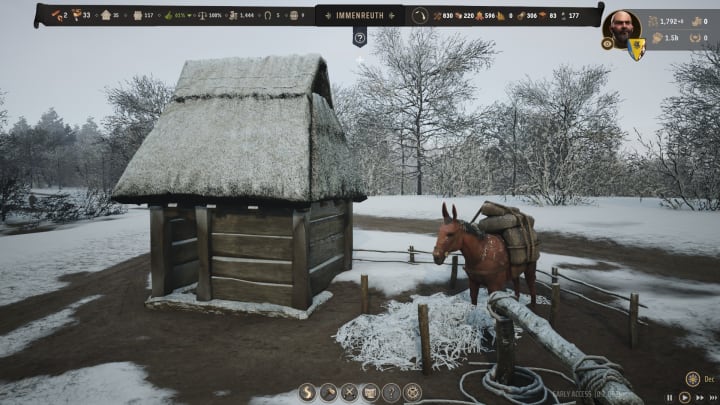Manor Lords: How to send resources to another region

Though you only start with access to a single region in Manor Lords, the map is divided into quite a few different areas you can expand to later on, allowing you to build additional towns and obtain even more resources.
We’re breaking down how to expand to another territory in the linked guide in detail, but to give you a very short overview of the process here, it boils down to amassing both Influence and Treasure and then claiming a region. Once that’s done, you can place down a new settlement.
It’d be good to boost this new village with a few resources or extract raw materials from it and send them back to your established town to be processed into advanced goods – however, we need to keep in mind that Manor Lords is set in a feudal society. Though we are the lords of our fiefs, we don’t have absolute control over the flow of resources, so there is no way to simply send, say, 25 units of bread from one settlement to another by giving a single command.
Still, you can set up internal trade networks in Manor Lords to exchange resources between regions you own – and this guide will teach you how to do it.
How to send resources to another region in Manor Lords
Though you can’t simply order one settlement to send resources to another for free, what you can do is facilitate bartering between them. For that to happen, you’ll first need to build a Pack Station in one of the settlements and assign a family to it.
Next, choose the resource you’d like to send to the other settlement as well as the resource you’d like to receive in return – remember, this is a trade. This being a trade, it will consider the value of the goods being sent and received to calculate the trade ratio.
If you’re trading sidearms for meat, the town getting the sidearms will obviously have to send a lot more meat back than it will receive sidearms. In order to facilitate more equal trades and get goods flowing from town to town faster, it’s a good idea to establish some product with a solid value in both towns to use as currency for exchange. Goods like warbows or roof tiles can be produced very easily from basic resources, but have a good trade value and can not only come in handy for any town, but can also be exported for Regional Wealth.
Going back to our sidearms trade as an example, it’d be much more efficient to exchange them for warbows of roof tiles instead of meat – unless the town the sidearms come from has a food crisis and needs it.
Since goods need to be physically transported between settlements by townsfolk, trades won’t be instant. You can purchase a mule and assign it to your Pack Station to transport more items or simply place several Pack Stations, if you’ve got the free manpower to work them.
Though this won’t allow you to control the number of resources traded precisely, you can just keep an eye on the storage in each town to keep track of things.
